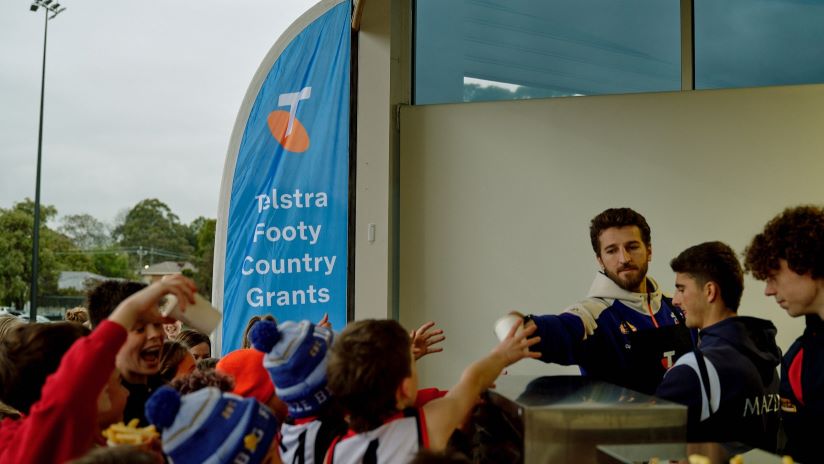Empowering innovation where it matters most
It seems that new start-ups are emerging daily with innovative products and services that seek to transform our lives. Apparently, it’s easy: all you need is an idea, a laptop and internet access. But for many non-profits striving to create change for their communities, it’s anything but easy. Most rely on funding to survive and funding is typically risk-averse. Non-profits are far more likely to be backed in pursuit of certainties than supported to experiment and break new ground. This means that their ability and capacity to develop digital products and services is often impeded from the start. This is where the Tech4Good Challenge comes in.

The challenge
How can we provide innovation funding and support for non-profits to experiment, take risks and realise potentially game-changing digital products and services for their communities?
The outcome
An investment and capability-building accelerator program based on lean startup principles, that empowers participating non-profits to build groundbreaking digital products and services from the ground-up.
Tech4Good Challenge
It seems that new startups are emerging daily with innovative products and services that seek to transform our lives. Apparently, it’s easy: all you need is an idea, a laptop and internet access. But for many non-profits striving to create change for their communities, it’s anything but easy. Most rely on funding to survive and funding is typically risk-averse. Non-profits are far more likely to be backed in pursuit of certainties than supported to experiment and break new ground. This means that their ability and capacity to develop digital products and services is often impeded from the start. This is where the Tech4Good Challenge comes in.
The Telstra Foundation is Telstra’s philanthropic charity. Its vision is to create social change through technology; one of its core activities is to support non-profits to reimagine what’s possible so they can amplify their impact.
In 2018, the Telstra Foundation launched a bold funding initiative – The Tech4Good Challenge – purposefully designed to run counter to the usual philanthropic conventions. Where most non-profit funding is focused on provision of capital, the Tech4Good Challenge (let’s call it T4G for short) puts the focus on building capability as well as powering capacity. And where most funding steers toward certain outcomes, T4G instead steers into opportunity and allows non-profits to embrace risk, run experiments and push the envelope.
To deliver on this premise, T4G takes the form of an accelerator program in which a cohort of non-profits are backed, supported and mentored to build digital products or services. It borrows its frameworks and methods unashamedly from the startup world. Participating non-profits are encouraged to use Human-Centred Design principles, employ Agile practices and build their concepts iteratively via ongoing user feedback loops. A collective of carefully selected mentors–among them entrepreneurs from the start-up world as well as experts from Telstra–provide guidance and coaching throughout. The non-profits are also connected to each other via a digital community platform and key meet-ups mapped throughout the program.
In Stage One of T4G, 15 non-profits working with disadvantaged youth used our seed capital, training and coaching to scope their digital concepts over a 5-month period. Based on the business cases and pitches put forward, a cohort of five non-profits–Big hART, Autism CRC, Expression Australia, Infoxchange and Orygen–then received Stage Two funding to build and pilot their products. Stage Three funding was just recently released, enabling the cohort to scale their emerging products and services.
Each participant has confirmed what can be achieved when you unleash creativity, experimentation and digital innovation in the non-profit sector– we believe this is a sector well placed to find innovative solutions to some of our most pressing social challenges.
– Jackie Coates, Telstra Foundation
So, what of the impact? From its own feedback loops with the non-profits that make up the present accelerator cohort, the Telstra Foundation has identified four big ways in which T4G is making its mark on participants and their communities.
Encouraging closer community engagement
T4G empowers non-profits to work closely with the young people they serve in developing new product and service ideas. This co-design approach has helped non-profits to forge deeper empathy with their communities, strengthen connections and be more responsive.
The program structure and format has encouraged us to be responsive to young people’s needs in a way no other grant program has ever allowed, let alone enabled.
– T4G Challenge partner
Shifting product design mindsets
For non-profits used to funding constraints and ‘waterfall’ management oversight, T4G has revealed a new approach to innovation that has powered a shift in mindset. Working in ambiguity, operating with agility and experimenting (relatively) liberally have become embraced as new norms.
There is an incredible degree of safety and trust in the process. Perfection and winning doesn’t feel like the goal, it’s about learning, understanding, adapting and building a keen focus on users.
– T4G Challenge partner
Building capability for today and into the future
Building capability was a driving intention behind T4G and has been delivered in spades. A skills gap has been recognised and is being filled. T4G has given participants training in a range of digital disciplines, which will pay dividends not only in the short-term but also the long-term.
From a professional development perspective, our team who have been directly involved in the programs have improved their capability and importantly, been given the confidence and support to think differently.
– T4G Challenge partner
Delivering organisational ‘ripple effects’
Whilst T4G sought to have specific impact on a relatively small group of product-focused peers within each non-profit, its ‘ripple effects’ have been felt throughout their organisations. There have been broader changes across mindsets, approaches and systems as a result of The T4G Challenge; up-skilling at an individual level has been mirrored by an upgrading of operating practices at an organisational level.
It is not an overstatement to say that we now operate as a start-up in many ways thanks to the encouragement and knowledge that we have gained from this program.
– T4G Challenge partner
The biggest impact has been the mindset shift. The skills and learning acquired have meant that the company is in a much better place to use digital solutions to better serve the communities and young people we work with.
– Mark Leahy, Big hART
Of course, we can’t forget the overall impact this is all striving for–improving the lives of disadvantaged young people. Early data on the social impact being created by T4G –via its incredible non-profit partners at Big hART, Autism CRC, Expression Australia, Infoxchange and Orygen–will be coming soon. For the Telstra Foundation this will only be the beginning of what is hoped to be a significant trail of impact over the medium- and long-term.
Next, we join our cohort as they move into a scaling mode. Where the opportunity to create social impact will be greater than ever and, we hope, the ripple effects will continue to be felt throughout our partner organisations. We’ll keep you posted.


